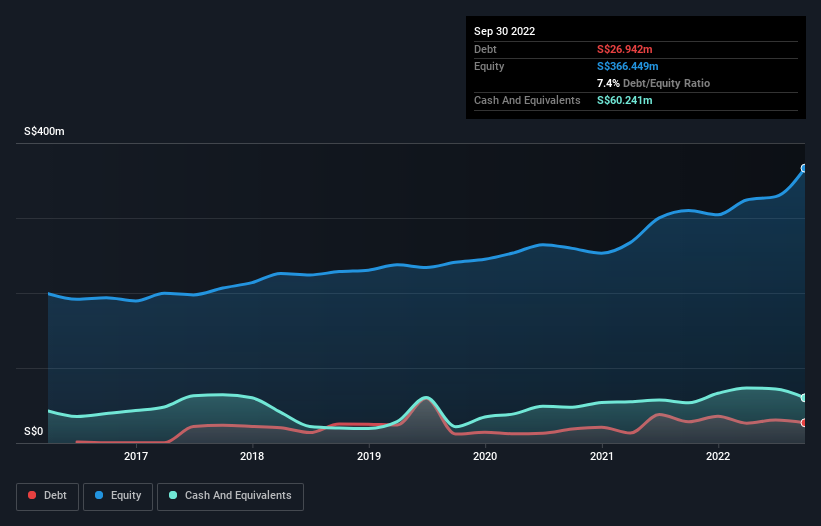- Singapore
- /
- Semiconductors
- /
- SGX:558
These 4 Measures Indicate That UMS Holdings (SGX:558) Is Using Debt Safely
Some say volatility, rather than debt, is the best way to think about risk as an investor, but Warren Buffett famously said that 'Volatility is far from synonymous with risk.' It's only natural to consider a company's balance sheet when you examine how risky it is, since debt is often involved when a business collapses. We note that UMS Holdings Limited (SGX:558) does have debt on its balance sheet. But is this debt a concern to shareholders?
What Risk Does Debt Bring?
Generally speaking, debt only becomes a real problem when a company can't easily pay it off, either by raising capital or with its own cash flow. In the worst case scenario, a company can go bankrupt if it cannot pay its creditors. However, a more usual (but still expensive) situation is where a company must dilute shareholders at a cheap share price simply to get debt under control. Having said that, the most common situation is where a company manages its debt reasonably well - and to its own advantage. The first thing to do when considering how much debt a business uses is to look at its cash and debt together.
See our latest analysis for UMS Holdings
How Much Debt Does UMS Holdings Carry?
You can click the graphic below for the historical numbers, but it shows that UMS Holdings had S$26.9m of debt in September 2022, down from S$28.4m, one year before. But on the other hand it also has S$60.2m in cash, leading to a S$33.3m net cash position.

How Strong Is UMS Holdings' Balance Sheet?
The latest balance sheet data shows that UMS Holdings had liabilities of S$81.9m due within a year, and liabilities of S$39.2m falling due after that. Offsetting this, it had S$60.2m in cash and S$94.2m in receivables that were due within 12 months. So it can boast S$33.3m more liquid assets than total liabilities.
This surplus suggests that UMS Holdings has a conservative balance sheet, and could probably eliminate its debt without much difficulty. Succinctly put, UMS Holdings boasts net cash, so it's fair to say it does not have a heavy debt load!
On top of that, UMS Holdings grew its EBIT by 57% over the last twelve months, and that growth will make it easier to handle its debt. When analysing debt levels, the balance sheet is the obvious place to start. But it is future earnings, more than anything, that will determine UMS Holdings's ability to maintain a healthy balance sheet going forward. So if you're focused on the future you can check out this free report showing analyst profit forecasts.
Finally, a business needs free cash flow to pay off debt; accounting profits just don't cut it. UMS Holdings may have net cash on the balance sheet, but it is still interesting to look at how well the business converts its earnings before interest and tax (EBIT) to free cash flow, because that will influence both its need for, and its capacity to manage debt. Over the most recent three years, UMS Holdings recorded free cash flow worth 67% of its EBIT, which is around normal, given free cash flow excludes interest and tax. This cold hard cash means it can reduce its debt when it wants to.
Summing Up
While we empathize with investors who find debt concerning, you should keep in mind that UMS Holdings has net cash of S$33.3m, as well as more liquid assets than liabilities. And it impressed us with its EBIT growth of 57% over the last year. So we don't think UMS Holdings's use of debt is risky. The balance sheet is clearly the area to focus on when you are analysing debt. But ultimately, every company can contain risks that exist outside of the balance sheet. To that end, you should be aware of the 1 warning sign we've spotted with UMS Holdings .
At the end of the day, it's often better to focus on companies that are free from net debt. You can access our special list of such companies (all with a track record of profit growth). It's free.
New: AI Stock Screener & Alerts
Our new AI Stock Screener scans the market every day to uncover opportunities.
• Dividend Powerhouses (3%+ Yield)
• Undervalued Small Caps with Insider Buying
• High growth Tech and AI Companies
Or build your own from over 50 metrics.
Have feedback on this article? Concerned about the content? Get in touch with us directly. Alternatively, email editorial-team (at) simplywallst.com.
This article by Simply Wall St is general in nature. We provide commentary based on historical data and analyst forecasts only using an unbiased methodology and our articles are not intended to be financial advice. It does not constitute a recommendation to buy or sell any stock, and does not take account of your objectives, or your financial situation. We aim to bring you long-term focused analysis driven by fundamental data. Note that our analysis may not factor in the latest price-sensitive company announcements or qualitative material. Simply Wall St has no position in any stocks mentioned.
About SGX:558
UMS Integration
An investment holding company, manufactures and markets precision machining components, and provides electromechanical assembly and final testing services.
Flawless balance sheet and undervalued.
Market Insights
Community Narratives




